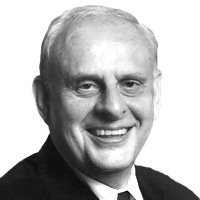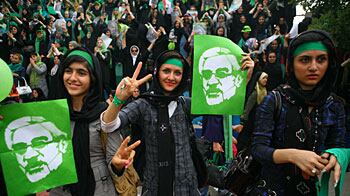
Reformers surged ahead of Friday’s elections, says Leslie H. Gelb, which could put the tumultuous country on a path to becoming America’s most important partner in the region.
Plus, read more insight on Iran's election from other Daily Beast writers.
If President Ahmadinejad doesn’t steal Iran’s presidential election on June 12, and if Supreme Leader Ayatollah Khamenei doesn’t overturn the results, that tumultuous country could be on a path to becoming America’s most important partner in the region. Those are big ifs. And the road forward will be most difficult. But so far, the electioneering has probably been the freest ever in that part of the world, and the leading challenger, Mir Hussein Mousavi, talks like a man the White House could work with on some of the most vexing and dangerous regional issues.
Whatever happens this time, Americans will finally be able to see clearly that Iran is not a monolith totally dominated by crazy clerics dedicated to Western destruction. They’ll see an Iran split between the familiar Islamic revolutionaries uniting clerics and the poor, on the one hand, and the commercial classes now allied with the educated, women and youth, on the other. They’ll see that the crazies, even if they hold on to power this time, are losing their grip. They’ll see other Iranian leaders who want to rejoin the world and will adjust their nation’s policies accordingly.
American leaders, in particular, will have to keep their hands off, let events play out, and let Iran’s moderate elements do things their way.
All of which is to say that odds are improving that sooner rather than later Iran will come to a strategic crossroad, and move to reconnect with the West and the United States. This emerging Tehran and President Obama’s Washington are bound to find a common bond in fighting extremism both in Iran and among its volatile neighbors. But American leaders, in particular, will have to keep their hands off, let events play out, and let Iran’s moderate elements do things their way.
Here’s the situation as election day nears. Bollywood could not have cast the candidates more devilishly than the Iranians themselves.
Of course, there is the likely “winner,” the incumbent president Mahmoud Ahmadinejad. While his rhetoric is bizarre, he himself is quite cunning. He plays almost exclusively to the religious extremists, nationalists, and the downtrodden who made the 1979 revolution. His quixotic policies have left the economy with extensive poverty and an inflation rate still over 15 percent annually. To capitalize on the strong sense of Iranian nationalism, he presses ahead with a nuclear program to show how he and Iran can defy America and the West.
The chief contender is Mousavi, a former 1979 revolutionary himself and prime minister during Iran’s war against Iraq. According to The Washington Post however, “most Iranians say that Mousavi, like many of the founders of the Islamic republic, has changed. They say the dogmatic hothead who wanted to spread the Islamic revolution around the world has become a pragmatic politician who firmly believes in Islamic governance, but also has called for greater freedoms and civil-rights protections.” His platform stresses Iran’s need to get sanctions lifted, to become part of the global economy, and to end its international isolation. Interestingly, he goes out of his way to condemn Ahmadinejad for denying the Holocaust. Tellingly, he often campaigns with his wife and younger people, the main targets of his campaign. On a side note, Mousavi’s wife has threatened to sue Ahmadinejad if he did not apologize for disparaging her during the recent televised debate between Ahmadinejad and Mousavi.
The other conservative contender is none other than the former head of the zealous Revolutionary Guard, Mohsen Rezaei. Rezaei is on Interpol’s Wanted list for crimes relating to the human-rights situation in Iran as well as the 1994 bombing of a Jewish center in Buenos Aires. On the reformist side, Mousavi is joined by Mehdi Karroubi, former speaker of the Iranian parliament. He is said to have support in rural areas, which could cut into Ahmadinejad’s vote there.
The vote takes place this Friday. While the conservative Rezaei has little chance himself, he could win just enough votes to prevent Ahmadinejad from securing a clear majority. In that case, a runoff would take place on June 19 between the two top candidates. It is widely believed that the higher the turnout the more likely Ahmadinejad will lose.
At this point, Mousavi’s major concern has to be that Ahmadinejad will manipulate the election results. If that falls short and Mousavi wins, Ayatollah Khamenei may step in and void the victory on grounds of Mousavi’s being insufficiently Islamic.
These two dictators—Khamenei and Ahmadinejad—probably will interfere, but if they do, it will cost them dearly because these elections have been so free and robust. There is nothing these candidates can’t do, except attack the supreme leader and Islam itself. The contenders have seized the opportunity to call one another liars and purveyors of corruption and worse.
According to news reports, the public feels that this election is different. The campaign this time around is palpably tenser and the atmosphere is hotter. Protesters are more numerous and vocal, perhaps because they sense the stakes are higher than ever.
Strikingly, for all the rancor about most issues, none of the candidates have made an issue out of Iran’s uranium-enrichment program. They all assert that Iran must have peaceful nuclear power, and that Tehran has the clear right to produce fuel from the enrichment process for that purpose. But none, including Ahmadinejad, has advocated outright that Iran should develop nuclear weapons. It’s quite apparent from talking to all sorts of Iranians, that enrichment is an issue of national honor. None want their country to be singled out for special discriminatory treatment by Washington, especially when Washington has accepted both peaceful nuclear energy and nuclear weapons in Pakistan, India, and Israel.
Right wingers in the United States and Israel don’t have much to say about the presidential contest in Iran because it muddies the policy waters for them. They’ve been making a push to further tighten economic sanctions against Iran and to set a deadline for Iran’s meeting American terms on nuclear enrichment or face the possibility of a military attack. And their problem has been enormously compounded by an apparent shift in President Obama’s position. In his Cairo speech last week, President Obama seemed to suggest that the United States would now draw the line not at uranium enrichment, but at a nuclear-weapons program. In other words, a peaceful fuel program would be OK under the strictest international inspection and undertakings not to go forward with nuclear weapons. There has been no reported reaction among the Iranian candidates to this statement, but it will loom large in the future.
Looming large right now is a seeming trend throughout this war-torn part of the world away from Islamic extremism and toward more moderate politics. This is what occurred in recent elections in Pakistan and Iraq, and most notably two days ago in Lebanon. In Lebanon, the pro-Western parties won a clear majority in the new Parliament.
It may be that the worst of the region’s anti-Americanism and religious extremism is running its course. The extremists have produced little besides brutality and poverty, and these elections hint that increasing majorities have had enough of the religious monsters. Iran, Iraq, and Lebanon are positive signs. Afghanistan and Pakistan remain very much up in the air. The Taliban extremists in these two countries are even too extreme for the Iranians. There is at least a decent chance now that the United States and Iran could work together against this threat if Iran continues to move in a positive direction. Washington should concentrate on not screwing up this chance in the coming months. Obama can always get tougher, later, if need be.
Xtra Insight: Plus, read more views on Iran's historic election from other Daily Beast writers.
Leslie H. Gelb, a former New York Times columnist and senior government official, is author of Power Rules: How Common Sense Can Rescue American Foreign Policy (HarperCollins 2009), a book that shows how to think about and use power in the 21st century. He is president emeritus of the Council on Foreign Relations.






